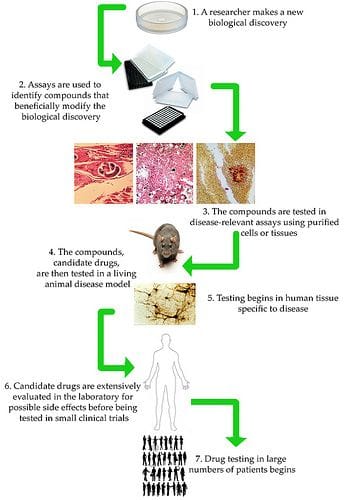The ArXiv preprint archive for research articles in physics, mathematics, computer science and related disciplines was initiated by Paul Ginsparg in 1991. ArXiv enables the rapid dissemination of research articles prior to peer review, and it quickly became very successful in this. ArXiv has not made the peer-reviewed journal obsolete, but rather provides a service that traditional journals – and that also includes Open Access journals – can’t provide. By 1998, more than 90% of all peer-reviewed papers published in high-energy physics first appeared on ArXiv. Nature Precedings was started in 2007 to provide similar services for research in biology, medicine (except clinical trials), chemistry and earth sciences. In addition, many preprints are also hosted in institutional repositories.
The research that I am doing is clinical research, trying to improve the treatment of patients with cancer. Most clinical trials are drug trials, but there are also surgical interventions, trials with medical devices, etc. Clinical trials are a special kind of research, and I have talked about some aspects in a previous post. Registration of clinical trials before the first patient is treated – providing key information from the trial protocol – is now required in many countries, including the United States and the European Union. The U.S. database of registered clinical trials (Clinicaltrials.gov) is publicly available, and the EU is working on doing the same with their EudraCT database. The International Committee of Medical Journal Editors (ICMJE), and in consequence many medical journals, also requires clinical trial registration. Since September 2008 the U.S. Food and Drug Administration (FDA) also requires all clinical trials registered at Clinicaltrials.gov to provide key results within 12 months after the last patient has finished treatment.
The results of clinical trials are rarely first reported in a peer-reviewed journal, but rather are usually first presented at a conference – in the case of important practice-changing clinical trials often before an audience of thousands of people. The conference abstracts are also an important source of information, even though they don’t provide the space for more detailed information, including tables and figures. Many societies publish conference abstract in their society journals, but bibliographic databases such as PubMed probably don’t cover all conference abstracts reporting clinical trial results.
The peer-reviewed paper is usually published months or even years after the conference presentation. This not only allows for more mature data – e.g. survival information – but also critical review and discussion of the data. The publication of the peer-reviewed paper is not the first time the medical community learns about the results of a clinical trial, or draws conclusions for their own research or clinical practice. To take a recent example from a clinical trial in cancer: the results of the TROPIC trial of cabazitaxel chemotherapy in hormone-refractory metastatic prostate cancer (Clinicaltrials.gov NCT00417079) were first reported at the ASCO Genitourinary Cancers Symposium March 5 (and there was a press release a day earlier). Capazitaxel was approved by the FDA on June 17, and I treated the first patient with the drug in September. The peer-reviewed paper was published in The Lancet October 2.
I would like to suggest that we need a preprint archive for clinical trial research papers. The preprints should be uploaded at the time of journal submission, or shortly after the conference presentation. The preprint server should add some structure to the preprints, e.g. linking to both the clinical trials registry (Clinicaltrials.gov, EudraCT, and others) and the published paper. The preprint should fulfill the requirement for reporting results set by the FDA. Articles in the preprint archive should be freely available, and should ideally provide the main results as downloadable datasets. The preprint server will only work if medical journals – and ideally the ICMJE – have a clear policy allowing prior publication as preprint.
This post was inspired by discussions with Salvatore Mele and Ivan Oransky. And it is my first contribution to the Open Access Week that starts on Monday.
References
- Fenner, M. (2010, March 15). Chances and problems of doing science online. Front Matter. https://doi.org/10.53731/r294649-6f79289-8cw4s
- De Bono, J. S., Oudard, S., Ozguroglu, M., Hansen, S., Machiels, J.-P., Kocak, I., Gravis, G., Bodrogi, I., Mackenzie, M. J., Shen, L., Roessner, M., Gupta, S., & Sartor, A. O. (2010). Prednisone plus cabazitaxel or mitoxantrone for metastatic castration-resistant prostate cancer progressing after docetaxel treatment: A randomised open-label trial. The Lancet, 376(9747), 1147–1154. https://doi.org/10.1016/S0140-6736(10)61389-X



